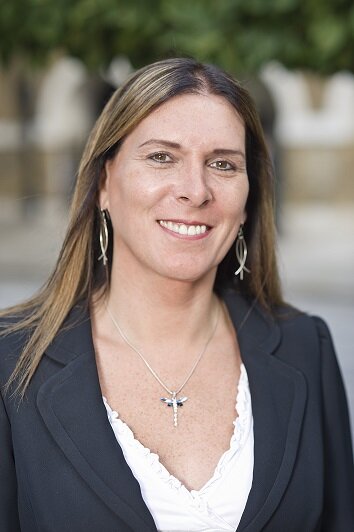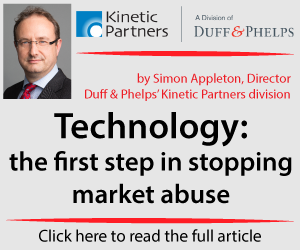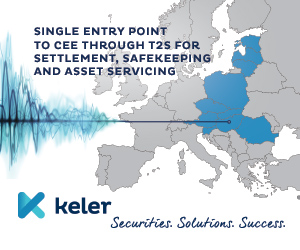A plan by Euroclear and The Depository Trust & Clearing Corporation (DTCC) to form a collateral processing joint venture, plus a separate agreement by Euroclear with BNP Paribas Securities Services, together underline the urgency and importance key industry players are attaching to an expected surge in collateral requirements.
Euroclear and DTCC, both of which are industry owned, plan to focus on launching a Margin Transit Utility (MTU) that will provide straight through processing to the settlement of margin obligations, and on piloting a Collateral Management Utility (CMU) to address the pressing problem of sub-optimal collateral mobility and allocation at a global level.
Meanwhile, Euroclear Bank and BNP Paribas Securities Services said their joint tri-party collateral management service, which was introduced in Italy and Spain last year, has been extended to Belgium, France, Germany and the Netherlands.
Peter Axilrod, head of corporate strategy and business development at DTCC, told ISS that collateral management and collateral processing are of great concern to the industry because all the new financial reform rules that are being put in place now around the world are going to significantly increase not only the amount of margin required but also the number of margin calls.
"From our mutual stakeholders -- Euroclear's and DTCC's -- our estimates consistently range between five and 10 times the number of current calls," said Axilrod (pictured in this article).
"The other thing that financial reform is doing is really creating more flows cross-border. If you look at what's generating the calls, a lot of it is the clearing requirements. So now there have to be separate calls in separate currencies for not only each clearing house but different products at each clearing house," he said.
The problematic calls in terms of operational processes are not between general clearing members or the futures commission merchants and the clearing house, but rather they are between clearing firms and their customers, which are in essence bilateral calls with respect to margin for cleared products, he said.
"If you consider that Euroclear and DTCC combined have roughly in excess of $75 trillion in securities on deposit in their respective depositories, it's clear that our two institutions have to be involved in this one way or another. And since we're both industry-owned, it was logical for us to do this jointly," Axilrod said.
He said that on the margin transit facility, DTCC has been engaged with "a large and broad cross-section of the industry", and it is expected to be launched in phases through 2015.
The collateral management utility is expected to leverage Euroclear software and applications used for its Collateral Highway but adapted to incorporate trans-Atlantic transactions. The implementation date, Axilrod said, will depend on industry readiness and regulatory approvals.
Saheed Awan, Euroclear Group's global head of collateral management, said the deal with BNP Paribas Securities Services is a continuation of a joint partnership established last year. He told ISS that that agreement and the DTCC joint venture plan highlighted the same trend.
"The common theme is the consolidation of pools of assets, of equities and fixed income around the world, for mutual clients, both of BNP Paribas Securities Services and of DTCC, to have a consolidated global inventory of their assets," Awan said.
He noted that BNP Paribas Securities Services represents one of the largest providers of custody services in Europe for broker-dealers, especially in southern Europe. "The same broker-dealers in the US, those who self-clear, would also obviously have their US assets, especially equities and corporate bonds, at the DTCC," he added.
"So, the technology is the same, i.e. we go in and get a view of the assets of our mutual clients - those of BNP Paribas Securities Service and of DTCC and of Euroclear -- build a global inventory, and then allocate that inventory by injecting instructions into BNP Paribas Security Service or DTCC on behalf of our clients to optimally allocate those assets to meet multiple obligations in different time zones."
DTCC and Euroclear said their JV, which is still being negotiated, will operate open architecture services, where DTCC’s and Euroclear’s settlement platforms represent two of many linked settlement locations. The companies plan to extend access to other interested settlement platforms such as central securities depositories, custodians and settlement agents.
"In bringing together two of the industry's largest post-trade market infrastructures, we will be addressing sub-optimal collateral mobility and allocation issues by creating the biggest open architecture collateral processing ecosystem, accessible to all market participants across the globe," Euroclear Chief Executive Tim Howell said, announcing the news earlier this week.
"By delivering tangible benefits to the industry, we will improve efficiency and mitigate risks at a time when regulatory change is expected to significantly increase the volume of margin calls and securities collateral settlement."
Michael C. Bodson, president & CEO of DTCC, said Euroclear and DTCC share a similar mission focused on supporting the efficiency of markets, maintaining market stability and reducing systemic risk while delivering shared economies of scale.
Separately, Frederic Hannequart, chairman of Euroclear Bank, said the partnership with BNP Paribas was part of the on-going extension of the Collateral Highway to more markets globally.
"Our joint customers can now take a holistic approach to collateral management and this service affords them the highest levels of cost and risk efficiencies when sourcing and allocating securities. Together with BNP Paribas, we are delivering a client-driven solution that hinges on open-source portfolio optimisation."























